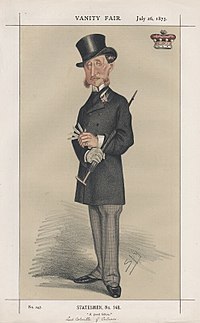Charles Colville, 1st Viscount Colville of Culross
PC | |
|---|---|
 "A good fellow". Colville as caricatured by "Spy" (Leslie Ward) in Vanity Fair, July 1873. | |
| Master of the Buckhounds | |
| In office 10 July 1866 – 1 December 1868 | |
| Monarch | Victoria |
| Prime Minister | The Earl of Derby Benjamin Disraeli |
| Preceded by | The Earl of Cork |
| Succeeded by | The Earl of Cork |
| Personal details | |
| Born | Charles John Colville 23 November 1818 |
| Died | 1 July 1903 (aged 84) |
| Nationality | British |
| Political party | Conservative |
| Spouse | Hon. Cecile Catherine Mary Carrington |
| Children | Stanley Colville |
| Parent |
|
Charles John Colville, 1st Viscount Colville of Culross,
Background and education
Colville was the son of General the Honourable
Career
Colville served as a captain in the
Colville was also Chairman of the Great Northern Railway Company from 1872 to 1895, a director of the Central London Railway at its opening in 1900 and President of the Honourable Artillery Company. He was made a Knight of the Thistle in 1874[12] and created Baron Colville of Culross, in the County of Perth, in 1885, in the Peerage of the United Kingdom.[13] In 1902 he was further honoured with a Viscountcy in the Coronation Honours list, when he was made Viscount Colville of Culross, in the County of Perth, on 15 July 1902.[14]
Family
Lord Colville of Culross married the Honourable Cecile Catherine Mary Carrington, eldest daughter of Robert Carrington, 2nd Baron Carrington, in 1853. Their second son was Sir Stanley Colville, who rose to prominence as a Navy officer. Another son, George, was the father of Sir Jock Colville, civil servant and memoirist. Lord Colville of Culross died in July 1903, aged 84, and was succeeded by his eldest son, Charles.
References
- ^ leighrayment.com Representative Peers – Scotland[usurped]
- ^ "No. 21297". The London Gazette. 2 March 1852. p. 671.
- ^ "No. 21398". The London Gazette. 4 January 1853. p. 1.
- ^ "No. 22106". The London Gazette. 2 March 1858. p. 1207.
- ^ "No. 22281". The London Gazette. 1 July 1859. p. 2550.
- ^ "No. 23139". The London Gazette. 17 July 1866. p. 4035.
- ^ "No. 23450". The London Gazette. 15 December 1868. p. 6654.
- ^ "No. 23136". The London Gazette. 11 July 1866. p. 3981.
- ^ "No. 23940". The London Gazette. 21 January 1873. p. 270.
- ^ "No. 27292". The London Gazette. 8 March 1901. p. 1648.
- ^ "No. 27602". The London Gazette. 2 October 1903. p. 6027.
- ^ leighrayment.com Knights of the Thistle[usurped]
- ^ "No. 25544". The London Gazette. 29 December 1885. p. 6300.
- ^ "No. 27455". The London Gazette. 18 July 1902. p. 4586.
